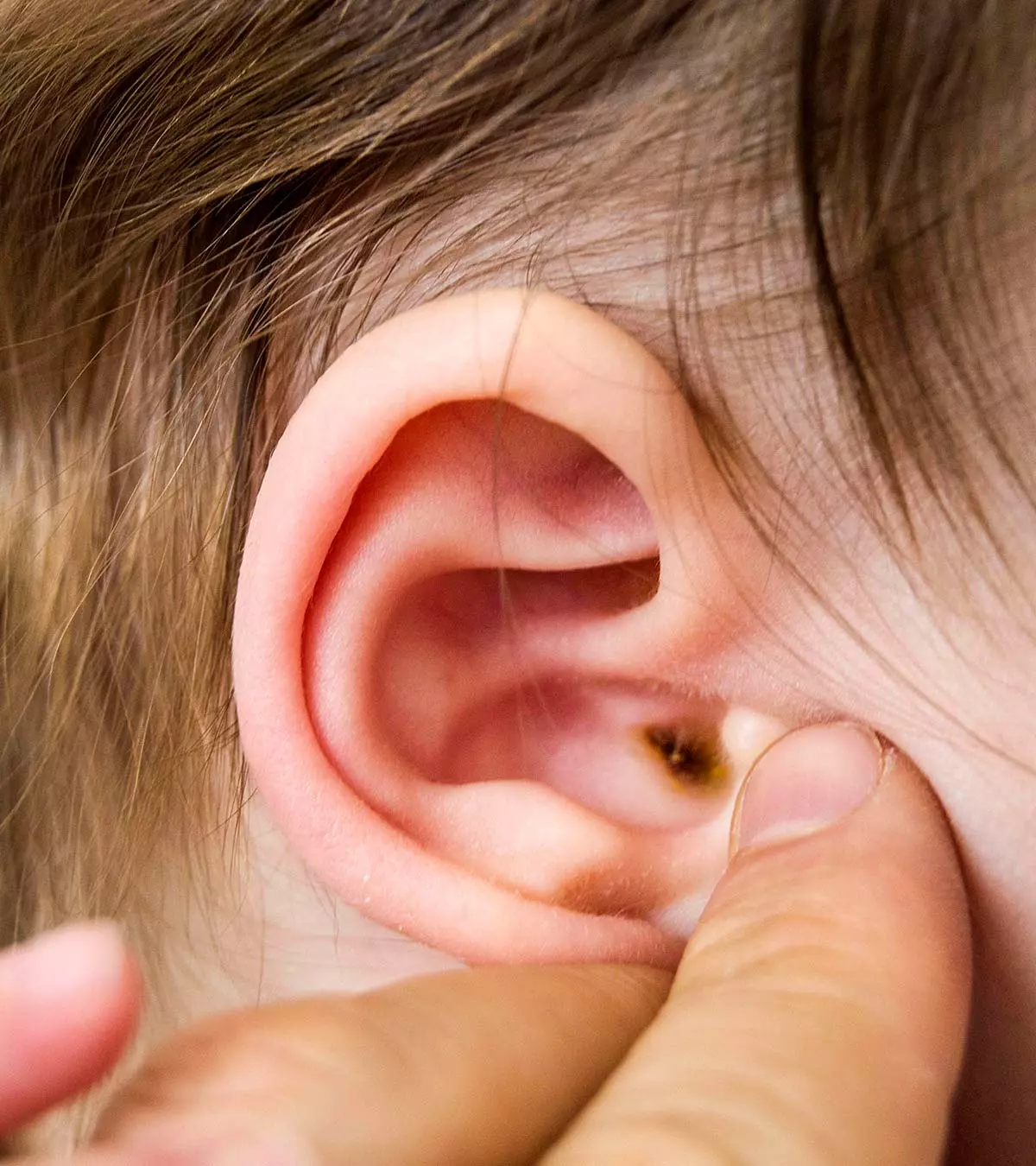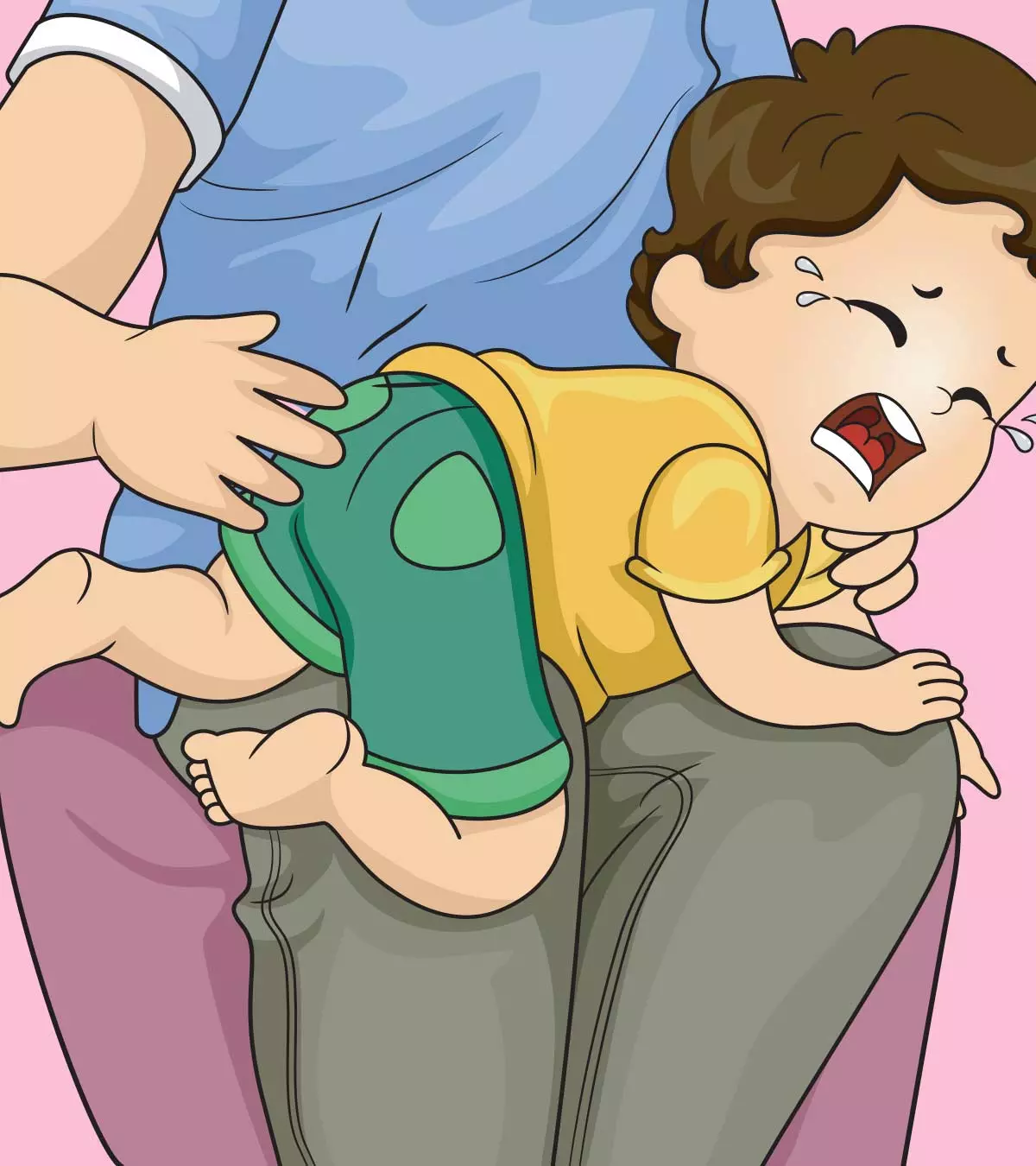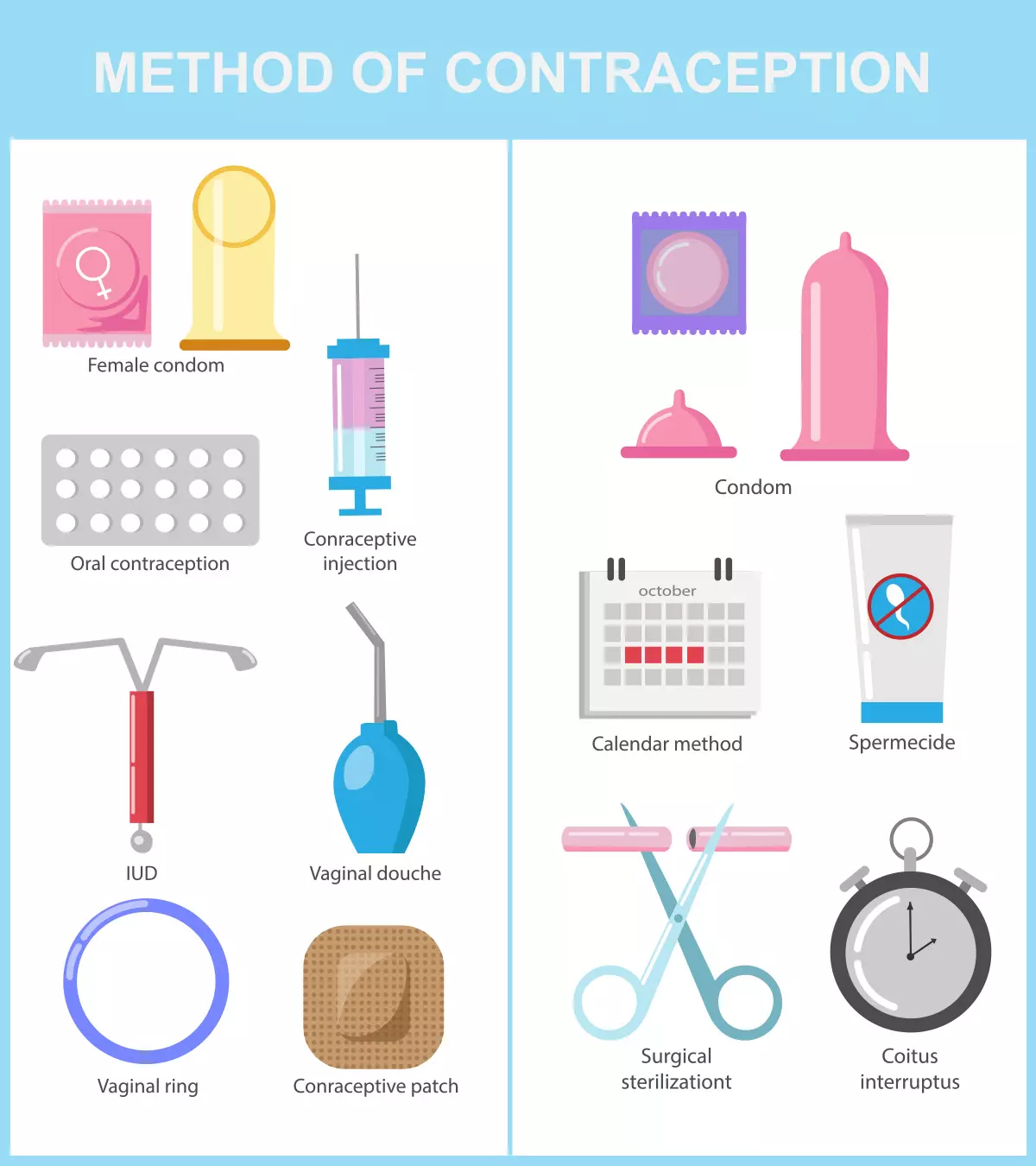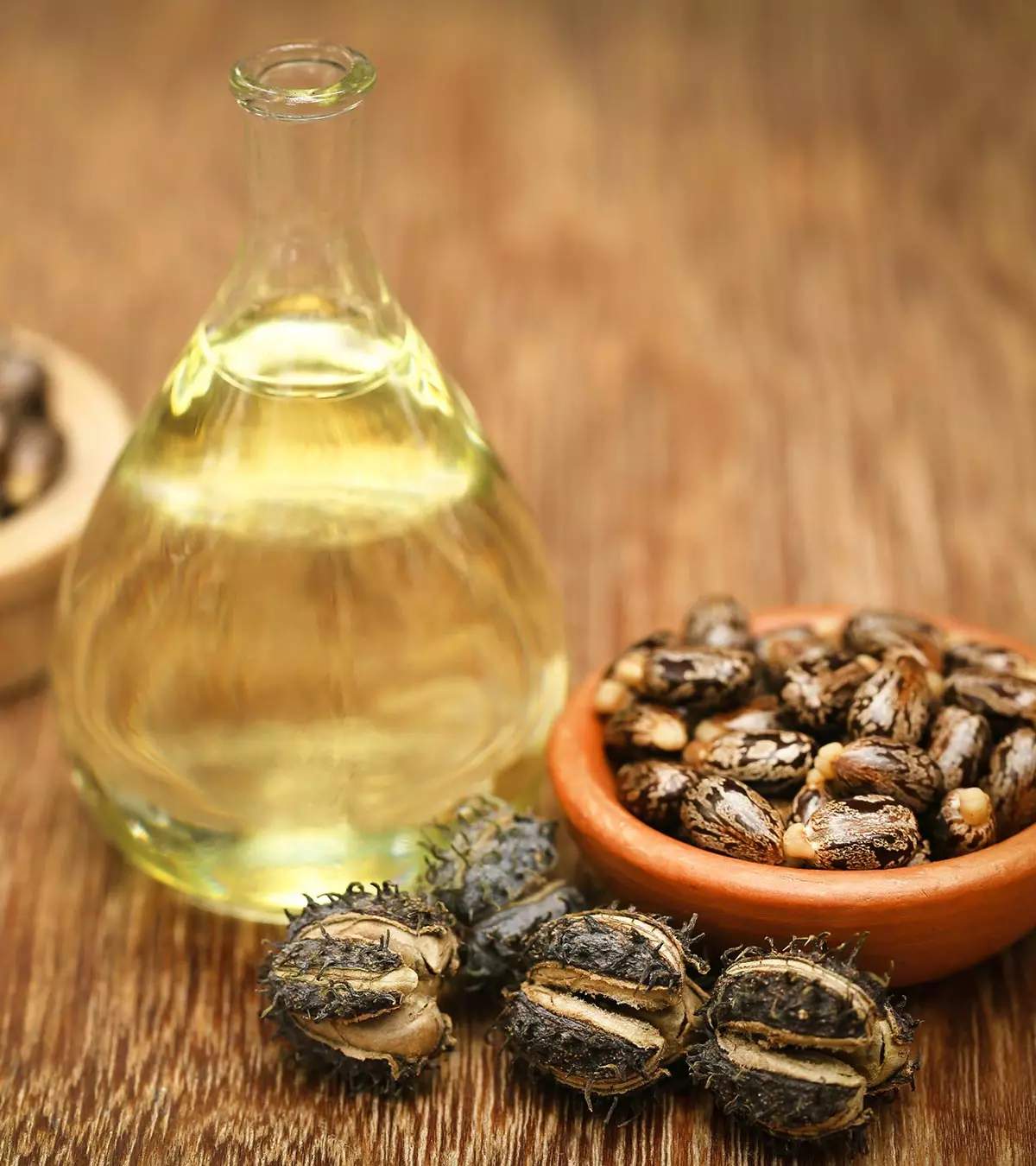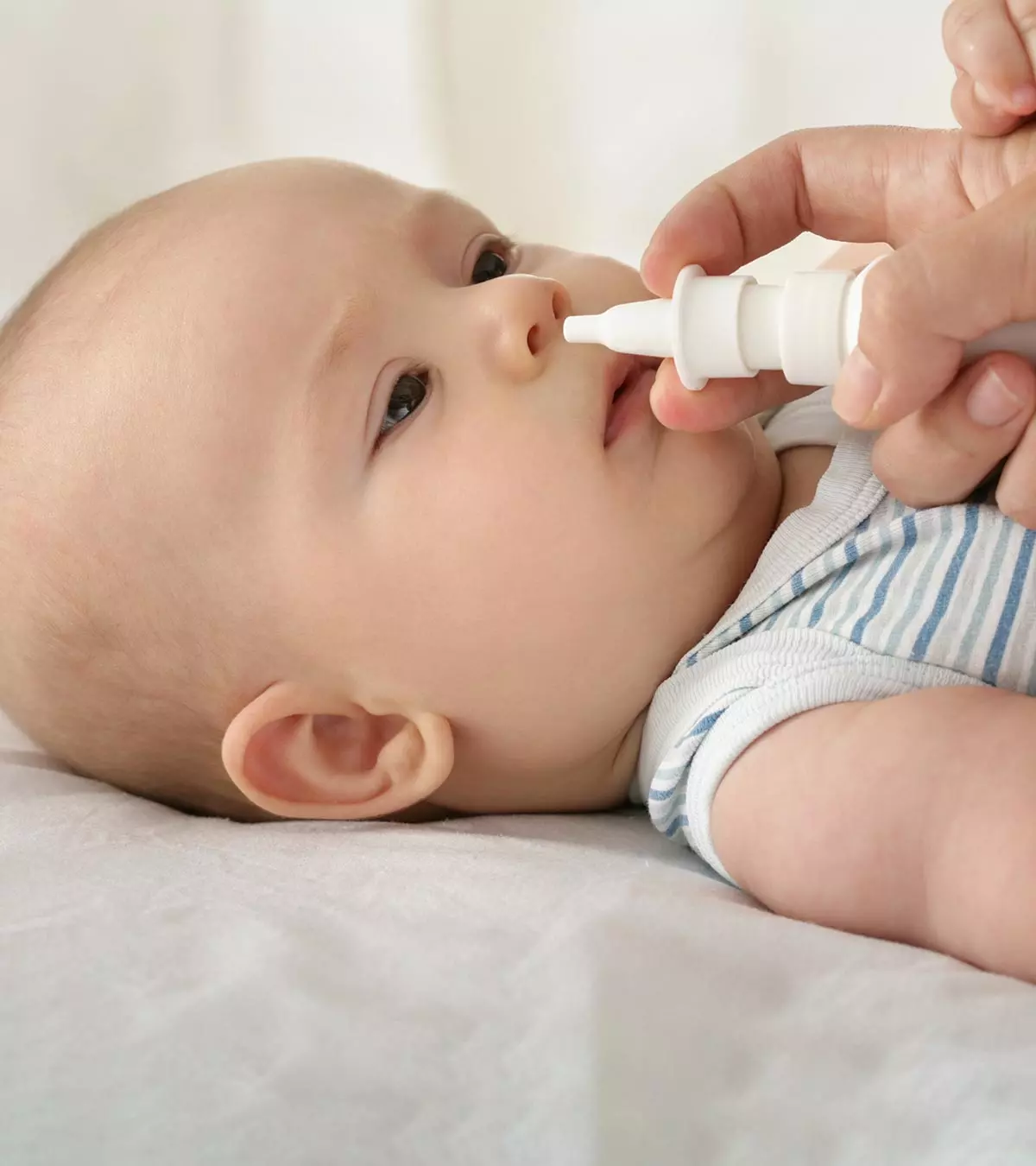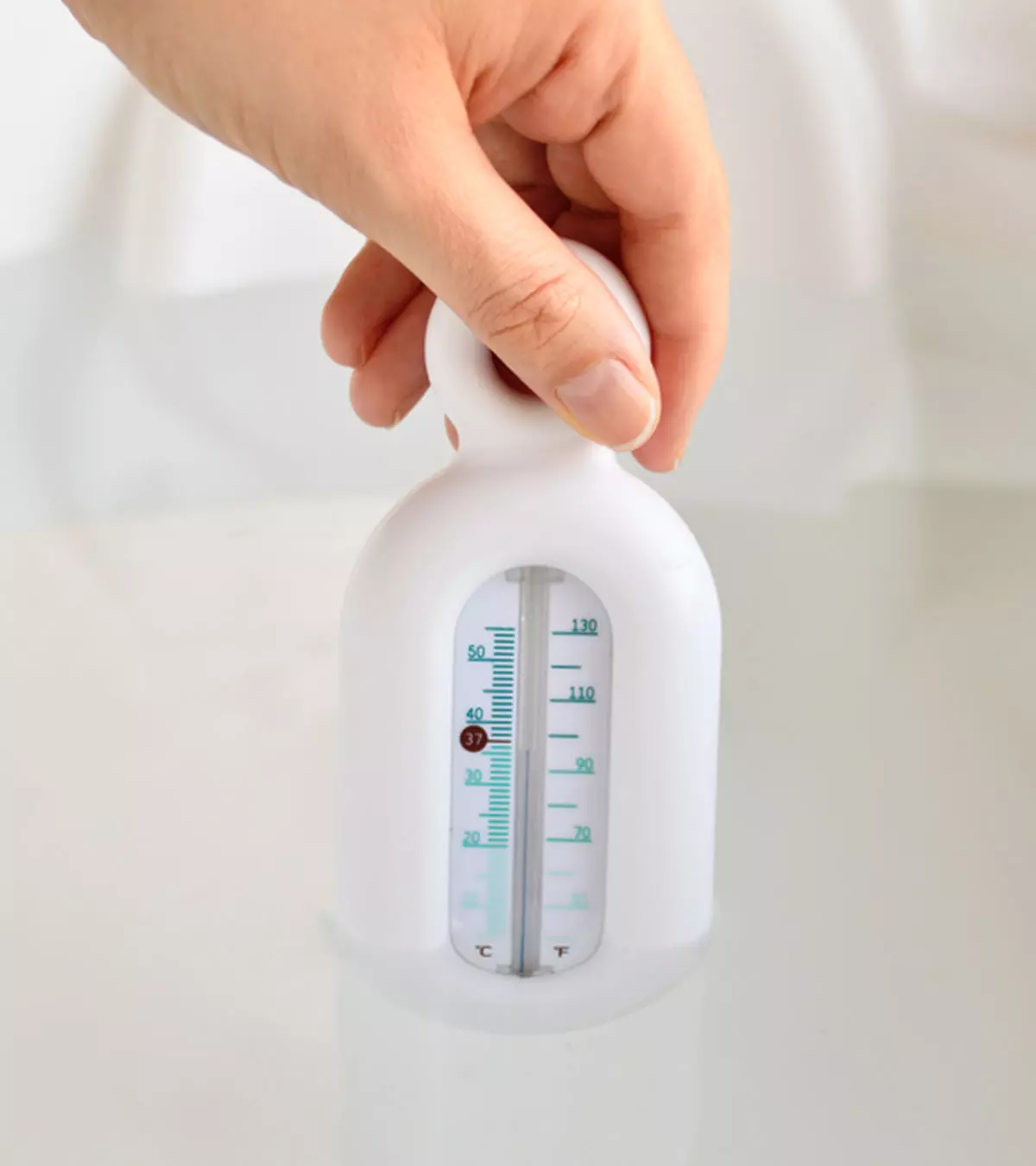
Image: ShutterStock
In most women, jaw pain in pregnancy may indicate temporomandibular joint dysfunction (TMD). Temporomandibular joints (TMJ) are located on each side of the face, and it connects the lower jaw to the skull.
Various musculoskeletaliA human body system that aids in the body's movement, shape, and stability and neuromusculariConditions affecting the nerves that control muscle movement disorders can affect the TMJ and lead to severe pain during talking and mastication (1). Pregnancy-induced jaw pain and dental pain can be due to hormonal changes (2). This may also cause headaches when pregnant. Swelling and stress with hormonal alterations can worsen jaw pain in pregnant women. However, simple care measures to ensure good dental health and some medications may help relieve this pain in most people. Keep reading this post to learn about the causes, risk factors, symptoms, tests, and treatments of jaw pain in expectant mothers.
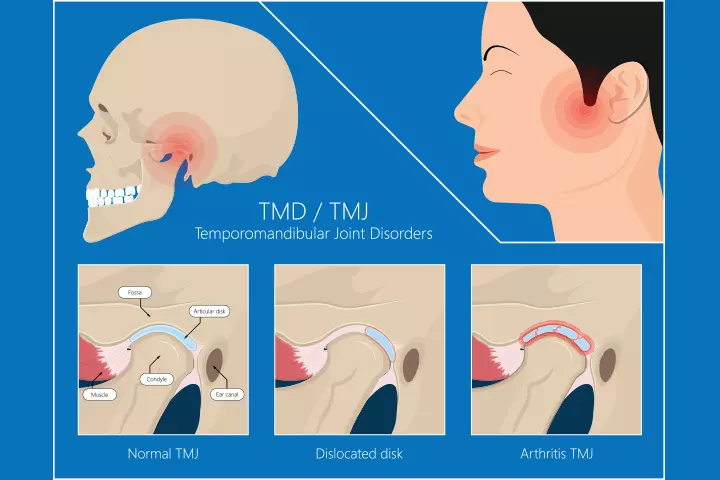
Key Pointers
- Temporomandibular joint dysfunction (TMD) may result in jaw pain during pregnancy.
- Hormonal changes, such as an increase in relaxin and estrogen hormones, commonly trigger the pain.
- Other contributing factors to jaw pain during pregnancy include teeth grinding, morning sickness, lack of calcium, sleeping on one side, history of TMJ pain, abscessed tooth, and ENT infections.
- Signs of TMJ problems and jaw pain during pregnancy can include headaches, jaw pain, difficulty opening the mouth, and others.
- Maintaining good posture, avoiding foods that require extensive chewing, and using relaxation techniques are ways to reduce jaw pain during pregnancy.
Causes Of Jaw Pain In Pregnancy
The following are the common causes of jaw pain in pregnancy.
1. Hormonal changes
EstrogeniA hormone vital for the development and function of the female reproductive system and present in males but in smaller amounts and relaxin hormones rise in pregnancy. These hormones increase the laxity of all the joints in the body to help in childbirth. However, it might lead to joint stretching and pain, including in the temporomandibular joints (3).
According to Dr. Jordan Weber, DDS, Burlington Dental Center, Kansas, United States, “The science on the relationship between estrogen levels and jaw pain (“TMD pain”) is inconclusive, although many researchers have suggested that there is a link of some kind. Due to the substantial hormonal changes that occur during pregnancy, it is nearly certain that hormones modify and potentially increase the incidence of jaw pain during pregnancy.”
2. Grinding of the teeth
The involuntary grinding of teeth is known as bruxism, which is often associated with anxiety or stress (4). Women prone to bruxism could experience an increase in teeth grinding due to stress during pregnancy. Chronic bruxism is one of the causes for jaw pain and temporomandibular joint disorder (TMJD) (5).
“Any life event that increases stress levels is likely to cause teeth clenching. So, the increased stress (combined with a reduction of sleep quality) during pregnancy will significantly increase a woman’s risk of teeth clenching and associated jaw pain,” notes Dr. Weber.
3. Morning sickness
Morning sickness, characterized by vomiting and nausea during pregnancy, can impact more than just a woman’s stomach. Vomiting may put excess pressure on the shoulder and neck muscles. The jaw needs to be thrust forward vigorously to expel the contents of the stomach. Frequent vomiting can strain or even sprain the jaw muscles. It can lead to pain in the TMJ (6).
4. Lack of calcium
The baby in the womb needs calcium to develop its skeleton. Calcium is needed the most in the second and third trimester of pregnancy. If there is insufficient calcium in the mother’s blood, then the body draws it from the bones to supply to the fetus (7).This might cause bone weakness and jaw pain in expecting mothers.
5. Sleeping on one side

Pregnant women find it comfortable to sleep on one side throughout the night. Sleeping on one side might cause pressure on the muscles of the jaw and cause jaw pain (8).
6. TMJ disorders
Women with a history of TMJ pain and problems might display an increase in the severity of jaw pain due to hormonal changes.
“Bi et al. hypothesized that increased estrogen may reduce jaw muscle nociception (pain response to a stimulus) in the TMJ area, and if there is inflammation present in the TMJ, there is resulting hyperalgesia (more severe pain) in the TMJ area.
Additionally, a study by LeResche suggested that while estrogen tends to reduce TMJ pain, significant changes in estrogen level are associated with more pain because our body likes harmony, and changes (mechanical, chemical or emotional) can arouse our fight or flight response which in turn causes more TMJ pain,” says Dr. Brijesh Chandwani, BDS, DMD Attending dentist, St. Barnabas Hospital, New York City Metropolitan Area.
7. Abscessed tooth
An infection, which causes pus collection at the base of the root of the tooth is known as an abscess. It causes tooth pain and might cause radiating or neuropathic pain in the entire jaw, intraoral or extraoral swelling, fever, tooth mobility, etc. (9) (10).
8. ENT infection
An infection in the ear, nose, or throat might cause pain that radiates to the jaws. Pressure resulting from excess mucus can also affect the jaw joint causing pain (11).
9. Wisdom teeth
When the wisdom teeth begin to erupt, they might push against other teeth, and make them move. This could cause stiffness and discomfort in the jaw. The pain from wisdom teeth radiates to the entire jaw or the TMJ (12).
10. Cardiovascular condition
Some individuals with cardiac diseases have pain in their jaws and TMJ. It is generic for both pregnant and non-pregnant patients (13). Certain pregnancy-related conditions, such as preeclampsiaiA pregnancy disorder characterized by high blood pressure, water retention, and protein content in urine. , preterm delivery, and gestational diabetesiPregnancy-specific condition characterized by high blood sugar levels, which may pose a risk of complications. , may increase the risk of cardiovascular disorders (14).
11. Injury
Jaw pain can result from injuries to the jaw muscles, jaw joints, or connective tissues, as well as from trauma to the neck or head caused by accidents such as blows or falls (15).
Symptoms Of TMJ Disorder And Jaw Pain In Pregnancy
The following are the commonly associated symptoms seen in TMJ disorders and jaw pain (6) (16) (17).
- Difficulty in chewing
- Difficulty in opening the mouth
- Limitation on the range of motion of the jaw
- TM joint clicking
- TM joint locking
- Tension in the face
- Swelling on one side of the face
- Frequent headaches in the temple region
- Morning headaches on waking up
- Sore jaw muscles
- Neck tension
- Ear pain
- Dizziness
- Problems with vision
Tips To Manage Jaw Pain During Pregnancy

The following precautions at home might help you manage TMJ pain during pregnancy (18) (19).
- Soft diet: Eating soft, easy-to-chew food might help reduce jaw pain. You can include some soft fruits and vegetables, as well as healthy and homemade smoothies and soups.
- Ice application: External application of ice over the jaw might help reduce localized swelling and muscle spasm.
- Restricted mouth opening: Try not to yawn, laugh, or yell too loudly. Avoid certain food items that are served whole. Chop food into smaller pieces so that you do not have to open your mouth wide open.
- Alteration in sleeping position: Try and avoid sleeping only on one side. Use a soft pillow.
- Posture changes: Avoid slouching in front of a laptop or a TV as it can strain your neck muscles and lead to jaw pain. Always sit with your back well-supported and use ergonomic furniture to adjust your posture.
- Manage stress: High stress levels are linked to conditions like bruxism (teeth grinding), which can lead to jaw pain and tension (4). Hence, it is recommended to engage in activities that can help reduce stress during pregnancy.
 Quick tip
Quick tipDiagnosis Of TMJ Disorder And Jaw Pain During Pregnancy
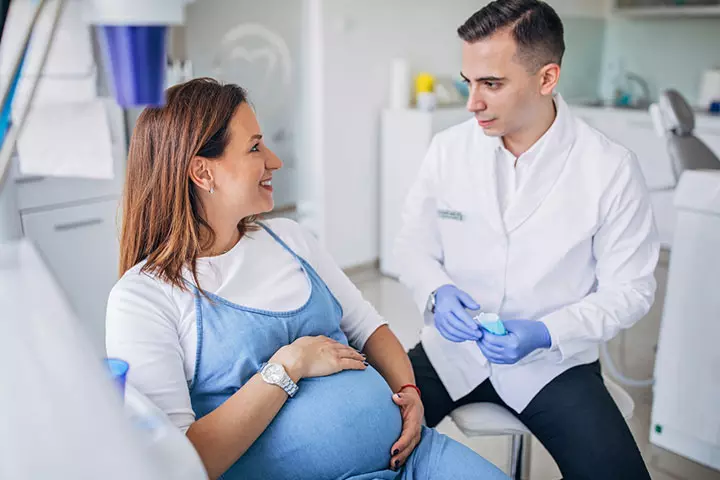
If you experience jaw pain during your pregnancy, then visit a dentist or your gynecologist at the birth center. There is no specific diagnostic test to evaluate TMJ disorders. The dentist might do the following to diagnose the cause and plan treatment accordingly (1).
- During clinical evaluation and symptoms assessment, the doctor will take note of all the symptoms and medical history, do a thorough clinical evaluation, and check all probable problem areas, including the head, neck, face, and jaw.
- They will palpateiTo examine by touch to assess the size, shape, or consistency of internal organs or other body parts and check for tenderness, popping, clicking, or difficulty in moving the joint.
- Although radiographs (x-rays) are contraindicated in pregnancy, if you are in severe pain and if necessary, then the dentist might suggest a panoramic x-ray known as an orthopantomogram (OPG) (20). It shows the upper jaw, lower jaw, and all the teeth.
- If the dentist suspects the pain is coming from one tooth due to a localized infection, then he/she might shoot a small intra-oral x-ray that would focus only on one tooth and that is safe in pregnancy.
- The doctor will check for the presence of an abscess, broken teeth, infections, or fractured jaws in these scans and plan your dental care
If any radiographic scans need to be performed for proper diagnosis, then the doctor will take all the precautions, like covering you in a lead apron and a lead thyroid collar to protect the baby from the harmful effects of dental x-rays.
 Quick fact
Quick factWhat Is The Treatment For TMJ Disorder And Pain In Pregnancy?

The doctor will evaluate your condition and suggest a treatment that is safe and efficient for pain management during pregnancy. The following are the commonly deployed treatment protocols (6) (15) (16).
- Jaw exercises and physical therapy: The doctor might recommend physical therapy for relief from pain.
- Massage: A physical therapist can teach you gentle self-massage techniques. You can do it yourself several times a day.
- Acupuncture: AcupunctureiA traditional Chinese medicine practice where thin needles are inserted into specific points of the body to treat various conditions might help in managing the symptoms of TMJ pain (21).
- Medications: Oral medications like paracetamol may be prescribed for pain. The topical application of pain relief and anti-spasm gels might also be recommended. In case of severe pain, the doctor might recommend pain relief injection at the site of pain. You should never self-medicate and only stick to prescription medicines.
- Breathing techniques: The doctor might recommend breathing techniques to ease anxiety and stress and to relax the tensed muscles.
- Root canal treatment: If the cause of jaw pain is due to a severe dental abscess, then you will require root canal treatment. This treatment is not contraindicated in pregnancy, but if not an emergency, then the doctor might postpone it until after the delivery. If jaw pain emerges early in pregnancy, then the second trimester is the safest time to get dental procedures done along with antibiotic coverage (22).
- Extraction: If the tooth infection is severe or the tooth is fractured, then the doctor might advise removal. Although elective extractions must be avoided in pregnancy, emergency extractions can be done during pregnancy (22).
- Mouthguard: A mouthguard is a habit-breaking appliance for habits like bruxism. It does not let the upper and lower teeth come in contact and could help relieve TMJ pain.
- Oral bite plates: Bite plates are similar to mouthguards and work as a cushion between the teeth. These plates could help reduce jaw muscle tightness and pain.
Frequently Asked Questions
1. Can pregnancy cause my jaw to hurt?
Pregnancy does not cause jaw pain in all women. Women prone to jaw pain might find it aggravated during pregnancy. Jaw pain can happen due to more than one reason. A study assessed the prevalence of orofacial pain, which includes jaw pain, in 80 pregnant women. The report states that “ The main pain experienced by pregnant women was that caused by hot/cold liquids or sweets (56.3%), followed by spontaneous pain (38.8%), pain in the face (23.8%), and pain in the joints of the jaw (21.3%) (23).
2. Is jaw pain a sign of labor?
Jaw pain is not a usual sign of labor. It can be associated with pneumomediastinum (presence of air between the two lungs), a rare condition that could occur due to the onset of labor pain (24).
3. Does chiropractic care relieve pregnancy jaw pain?
According to Dr. Gurpreet Sidhu, a US-trained Canadian dentist, “A chiropractor uses a combination of intraoral massage of the masseteriOne of the strongest muscles in the human body located in the jaw that helps with biting and chewing and temporalisiA large muscle located in the temple area, responsible for closing the jaw and movement of the mandible muscles in conjunction with an extraoral massage of the digastric and platysmal muscles. Using a small handheld activator, a chiropractor can provide small TMJ pressure pulses to reset the ligament in the joint, which may help alleviate jaw pain.”
4. Can pregnancy flare up TMJ?
“Pregnancy can flare up TMJ. It is because the hormone levels in a woman’s body fluctuate during pregnancy, which can change the alignment of the teeth and jaw. This can then put extra pressure on the TMJ, causing inflammation,” says Dr. Cary Goldstein, DMD, Owner of Goldstein Dental Center, Atlanta, Georgia, United States.
5. Can pregnancy cause teeth clenching?
“Pregnancy can cause teeth clenching for various reasons. First, hormonal changes during pregnancy can cause a woman to feel more anxious and stressed, leading to teeth clenching. Additionally, the physical changes that occur during pregnancy, such as an increase in belly size, can make it difficult to get comfortable at night, leading to teeth clenching. Pregnancy can also cause sleep apneaiA disorder where a person's breathing is repeatedly interrupted during sleep, leading to poor sleep quality and daytime fatigue , which can also lead to teeth clenching,” notes Dr. Goldstein
6. Can preeclampsia cause jaw pain?
No, jaw discomfort is not one of the preeclampsia symptoms (25). Hence, preeclampsia is not known to cause jaw pain.
7. When should I seek emergency medical care for jaw pain during pregnancy?
Severe jaw pain, especially if accompanied by chest pain, shortness of breath, or pain radiating down your left arm, as this could indicate a cardiac event. Additionally, seek medical care if you have jaw pain with significant facial swelling, fever, or difficulty opening your mouth fully, as these may require prompt treatment.
Hormonal changes may affect the temporomandibular joints and cause jaw pain during pregnancy. Calcium deficiency, teeth grinding, tooth or gum infection, ENT infections, or other factors may also contribute to jaw pain. Altering sleep positions, eating soft foods, or applying an ice pack may help reduce pain intensity. Avoid taking non-prescription medicines and consult a dentist if jaw pain persists despite maintaining good oral health and no apparent signs of infection or injury. The treatment may include physical therapy, medications, massage, or other methods to reduce jaw muscle tightness, depending on the underlying condition.
Infographic: Tips To Manage Jaw Pain During Pregnancy
Experiencing jaw pain when pregnant can be uncomfortable, interfere with your daily routine, and prevent you from getting adequate sleep. So if you want easy solutions that you can try at home, this infographic brings a few effective ones that may help ease the pain before reaching out to a doctor. Illustration: Momjunction Design Team
Illustration: Unexpected Causes Of Jaw Pain During Pregnancy
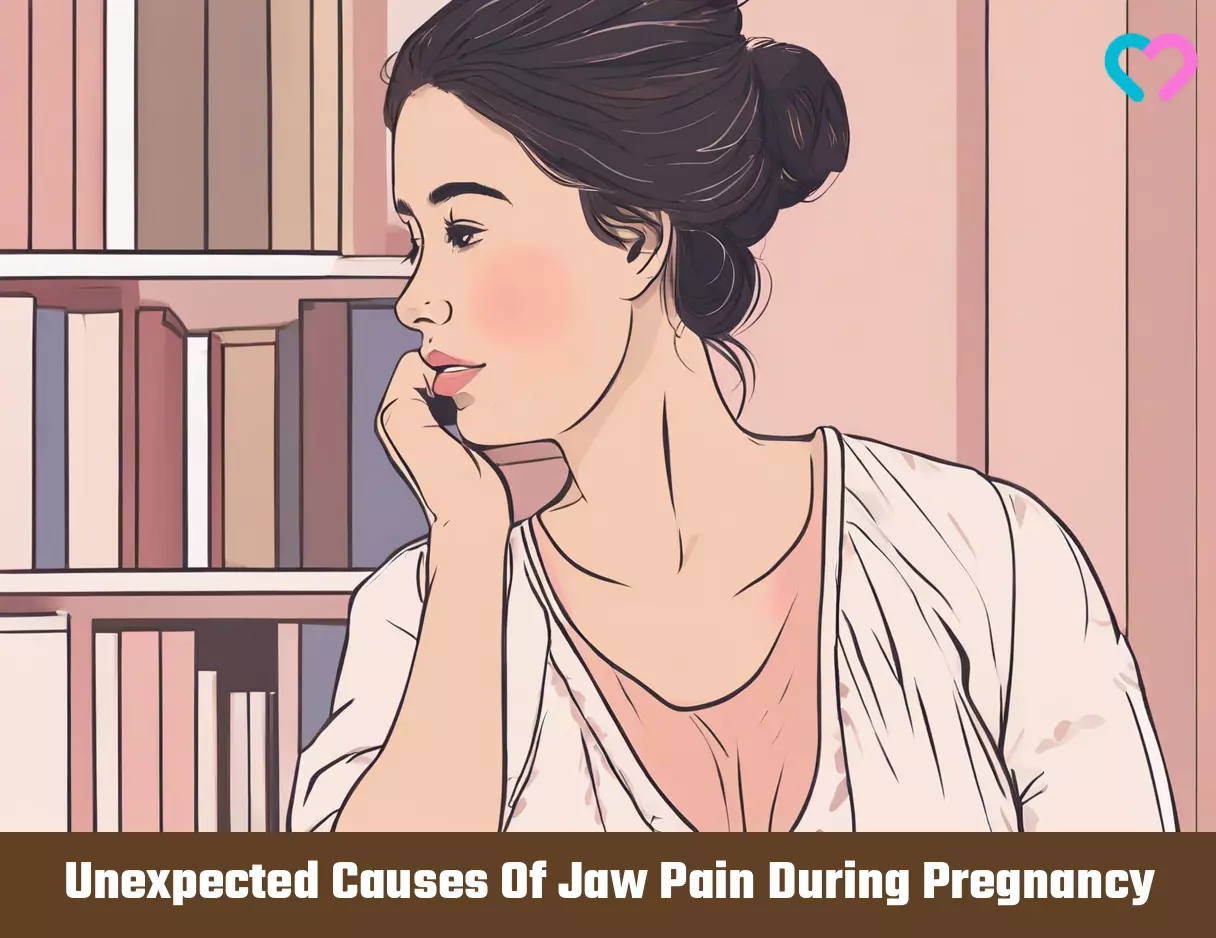
Image: Stable Diffusion/MomJunction Design Team
Are you experiencing jaw pain during pregnancy? Gain valuable insights into the reasons behind its prominence during this period in this informative video.
References
- Robert L. Gauer And Michael J. Semidey; (2015); Diagnosis and Treatment of Temporomandibular Disorders.
https://www.aafp.org/pubs/afp/issues/2015/0315/p378.html - The Effects of Pregnancy on Your Oral Health.
https://robinsondental.org/the-effects-of-pregnancy-on-your-oral-health/ - Temporomandibular disorders and pregnancy.
https://www.scielo.br/j/rdor/a/VTtn3BTHVMRR3FP6GHyJ4ph/?lang=en - Victória dos Santos Chemelo et.al; (2020); Is There Association Between Stress and Bruxism? A Systematic Review and Meta-Analysis.
https://pmc.ncbi.nlm.nih.gov/articles/PMC7793806/ - Teeth grinding (bruxism).
https://www.nhs.uk/conditions/teeth-grinding/ - Afa Bayramova; (2018); TMD and pregnancy?
https://www.obstetricgynecoljournal.com/articles/cjog-aid1001.php - Bone Health and Osteoporosis.
https://www.niams.nih.gov/health-topics/bone-health-and-osteoporosis - Common Practices That Can Worsen TMJ Disorder.
https://iccmo.org/blog/post/common-practices-that-can-worsen-tmj-disorder - Abscessed Teeth.
https://www.aae.org/patients/dental-symptoms/abscessed-teeth/ - Tooth Decay.
https://medlineplus.gov/toothdecay.html - What Causes Jaw Pain?
https://www.sfenta.org/ent-conditions/other-ent-conditions/jaw-pain/ - Symptoms that may indicate you need your Wisdom Teeth Removed.
https://stjohnhealth.com.au/symptoms-that-may-indicate-you-need-your-wisdom-teeth-removed/ - Mohsen Dalband et.al; (2011); Bilateral temporomandibular joint pain as the first and only symptom of ischemic cardiac disease: a case report.
https://pubmed.ncbi.nlm.nih.gov/22490449/ - Heart disease looks different for women — and pregnancy can increase your risk.
https://www.peacehealth.org/healthy-you/heart-disease-looks-different-women-and-pregnancy-can-increase-your-risk - Anita M. Mark; (2019); Why does my jaw hurt?
https://secure.jbs.elsevierhealth.com/action/getSharedSiteSession?redirect=https%3A%2F%2Fjada.ada.org%2Farticle%2FS0002-8177(19)30575-6%2Ffulltext&rc=0 - Jaw Pain.
https://www.mouthhealthy.org/all-topics-a-z/jaw-pain - TMJ Disorders.
https://www.facepain.org/understanding-facial-pain/diagnosis/tmj/ - TMJ Disorders: How To Find Relief for Your Aching Jaw.
https://health.clevelandclinic.org/tmj-how-to-find-the-relief-you-need-for-your-aching-jaw-and-or-face-and-teeth - TMJ Pain Relief: 8 Best Practices to Help Manage Temporomandibular Joint Disorders.
https://www.pennmedicine.org/updates/blogs/health-and-wellness/2020/september/tmj-pain-relief-8-best-practices-to-help-manage-tmd - L L Habets et.al; (1989); The OPG: an aid in TMJ diagnostics. III. A comparison between lateral tomography and dental rotational panoramic radiography (Orthopantomography).
https://pubmed.ncbi.nlm.nih.gov/2795316/ - Jun-Yi Wu; (2017); Acupuncture therapy in the management of the clinical outcomes for temporomandibular disorders.
https://pmc.ncbi.nlm.nih.gov/articles/PMC5340435/ - Pregnancy and Dental Work.
https://americanpregnancy.org/healthy-pregnancy/is-it-safe/dental-work-and-pregnancy/ - Fernanda Lopez Rosell et.al; (2014); Prevalence and severity of orofacial pain in pregnant women.
https://pdfs.semanticscholar.org/8650/b4a6a536bb5d4c2350f9c264b4fee9cd64b5.pdf - Janice C. Raley and Janet I. Andrews; (2001); Spontaneous pneumomediastinum presenting as jaw pain during labor.
https://www.sciencedirect.com/science/article/abs/pii/S0029784401015149 - Preeclampsia-Is it just a pregnancy symptom or something more?
https://www.preeclampsia.org/signs-and-symptoms - Temporomandibular disorder (TMD).
https://www.nhs.uk/conditions/temporomandibular-disorder-tmd/
Community Experiences
Join the conversation and become a part of our nurturing community! Share your stories, experiences, and insights to connect with fellow parents.
Read full bio of Dr. Shashwat Jani

Dr. Cary Goldstein, the owner of Goldstein Dental Center, Atlanta, specializes in Cosmetic Dentistry with over 37 years of experience. He holds a Bachelor’s degree in Psychology from the University of Georgia, a DMD from the Medical College of Georgia, and a master's in Prosthodontics from the University of Southern California School of Dentistry.
Dr. Cary Goldstein, the owner of Goldstein Dental Center, Atlanta, specializes in Cosmetic Dentistry with over 37 years of experience. He holds a Bachelor’s degree in Psychology from the University of Georgia, a DMD from the Medical College of Georgia, and a master's in Prosthodontics from the University of Southern California School of Dentistry.
- Dr. Gurpreet Sindhu is a general dentist at Lighthouse Dental Center, Langley, Canada. He holds a BS degree in Microbiology, BA in Psychology from the University of British Columbia, and a Doctorate in Dental Surgery from the University of Detroit Mercy. He has over 20 years of experience in dentistry.
 Dr. Gurpreet Sindhu is a general dentist at Lighthouse Dental Center, Langley, Canada. He holds a BS degree in Microbiology, BA in Psychology from the University of British Columbia, and a Doctorate in Dental Surgery from the University of Detroit Mercy. He has over 20 years of experience in dentistry.
Dr. Gurpreet Sindhu is a general dentist at Lighthouse Dental Center, Langley, Canada. He holds a BS degree in Microbiology, BA in Psychology from the University of British Columbia, and a Doctorate in Dental Surgery from the University of Detroit Mercy. He has over 20 years of experience in dentistry. - Dr. Jordan Weber is a general dentist practicing at Burlington Dental Center, Kansas. He has a bachelor’s degree in dentistry from the University of Missouri-Kansas City School of Dentistry. Dr. Weber also holds a degree in food science.
 Dr. Jordan Weber is a general dentist practicing at Burlington Dental Center, Kansas. He has a bachelor’s degree in dentistry from the University of Missouri-Kansas City School of Dentistry. Dr. Weber also holds a degree in food science.
Dr. Jordan Weber is a general dentist practicing at Burlington Dental Center, Kansas. He has a bachelor’s degree in dentistry from the University of Missouri-Kansas City School of Dentistry. Dr. Weber also holds a degree in food science. - Dr. Brijesh Chandwani is a residency-trained orofacial pain specialist and a licensed acupuncturist. He holds 15 years of experience in modalities and specializes in complex facial pain conditions. He received his BDS and DMD degrees from Tufts University.
 Dr. Brijesh Chandwani is a residency-trained orofacial pain specialist and a licensed acupuncturist. He holds 15 years of experience in modalities and specializes in complex facial pain conditions. He received his BDS and DMD degrees from Tufts University.
Dr. Brijesh Chandwani is a residency-trained orofacial pain specialist and a licensed acupuncturist. He holds 15 years of experience in modalities and specializes in complex facial pain conditions. He received his BDS and DMD degrees from Tufts University.
Read full bio of Dr. Ritika Shah
Read full bio of Rebecca Malachi
Read full bio of Dr. Joyani Das







